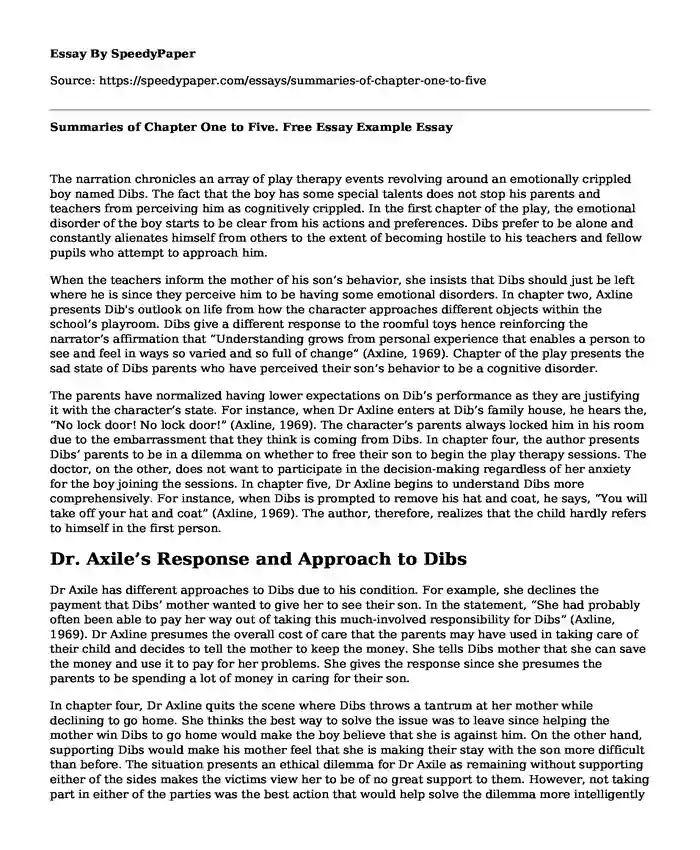
| Type of paper: | Essay |
| Categories: | Writing Psychology Family Emotional intelligence |
| Pages: | 3 |
| Wordcount: | 631 words |
The narration chronicles an array of play therapy events revolving around an emotionally crippled boy named Dibs. The fact that the boy has some special talents does not stop his parents and teachers from perceiving him as cognitively crippled. In the first chapter of the play, the emotional disorder of the boy starts to be clear from his actions and preferences. Dibs prefer to be alone and constantly alienates himself from others to the extent of becoming hostile to his teachers and fellow pupils who attempt to approach him.
When the teachers inform the mother of his son’s behavior, she insists that Dibs should just be left where he is since they perceive him to be having some emotional disorders. In chapter two, Axline presents Dib's outlook on life from how the character approaches different objects within the school’s playroom. Dibs give a different response to the roomful toys hence reinforcing the narrator’s affirmation that “Understanding grows from personal experience that enables a person to see and feel in ways so varied and so full of change” (Axline, 1969). Chapter of the play presents the sad state of Dibs parents who have perceived their son’s behavior to be a cognitive disorder.
The parents have normalized having lower expectations on Dib’s performance as they are justifying it with the character’s state. For instance, when Dr Axline enters at Dib’s family house, he hears the, “No lock door! No lock door!” (Axline, 1969). The character’s parents always locked him in his room due to the embarrassment that they think is coming from Dibs. In chapter four, the author presents Dibs’ parents to be in a dilemma on whether to free their son to begin the play therapy sessions. The doctor, on the other, does not want to participate in the decision-making regardless of her anxiety for the boy joining the sessions. In chapter five, Dr Axline begins to understand Dibs more comprehensively. For instance, when Dibs is prompted to remove his hat and coat, he says, “You will take off your hat and coat” (Axline, 1969). The author, therefore, realizes that the child hardly refers to himself in the first person.
Dr. Axile’s Response and Approach to Dibs
Dr Axile has different approaches to Dibs due to his condition. For example, she declines the payment that Dibs’ mother wanted to give her to see their son. In the statement, “She had probably often been able to pay her way out of taking this much-involved responsibility for Dibs” (Axline, 1969). Dr Axline presumes the overall cost of care that the parents may have used in taking care of their child and decides to tell the mother to keep the money. She tells Dibs mother that she can save the money and use it to pay for her problems. She gives the response since she presumes the parents to be spending a lot of money in caring for their son.
In chapter four, Dr Axline quits the scene where Dibs throws a tantrum at her mother while declining to go home. She thinks the best way to solve the issue was to leave since helping the mother win Dibs to go home would make the boy believe that she is against him. On the other hand, supporting Dibs would make his mother feel that she is making their stay with the son more difficult than before. The situation presents an ethical dilemma for Dr Axile as remaining without supporting either of the sides makes the victims view her to be of no great support to them. However, not taking part in either of the parties was the best action that would help solve the dilemma more intelligently to remain relevant to both Dibs and his mother.
Reference
Axline, V. (1969). Dibs: ln Search of Self.
Cite this page
Summaries of Chapter One to Five. Free Essay Example. (2023, Aug 21). Retrieved from https://speedypaper.com/essays/summaries-of-chapter-one-to-five
Request Removal
If you are the original author of this essay and no longer wish to have it published on the SpeedyPaper website, please click below to request its removal:
- Louis Armstrong Essay Samples
- Socio-cultural Literacy Analysis in Our Free Essay Sample
- Free Essay: Exploration of the Oppressive Nature of Marriage in K. Chopin's "The Story of an Hour"
- Compare and Contrast Essay Sample: Thematic Poem Analysis
- Literary Essay Sample: Desdemona's Symbolic Presence in Othello
- The Gender Pay Gap - Free Essay for Everyone
- Paper Example - The 2008 Obama Elections
Popular categories




